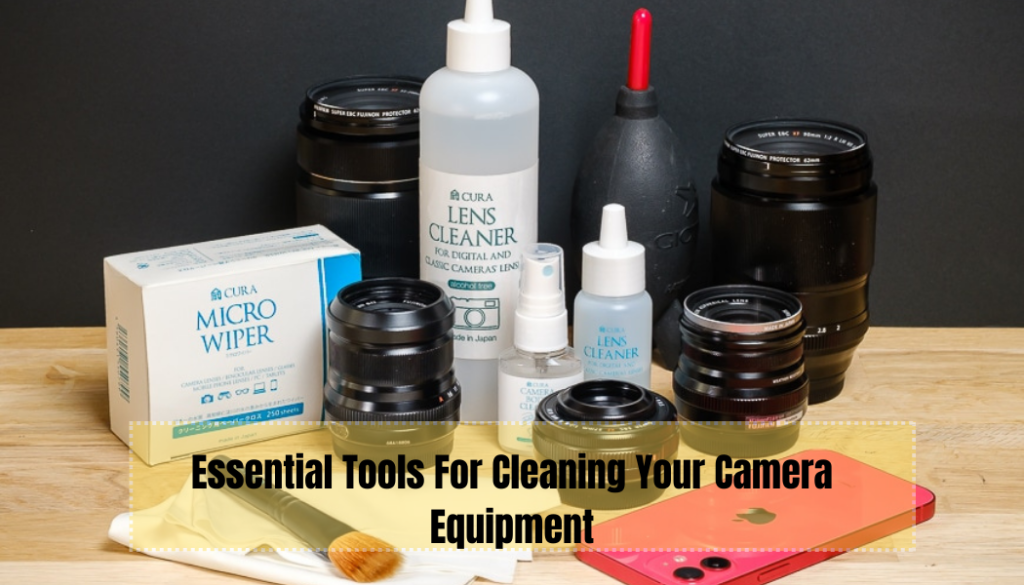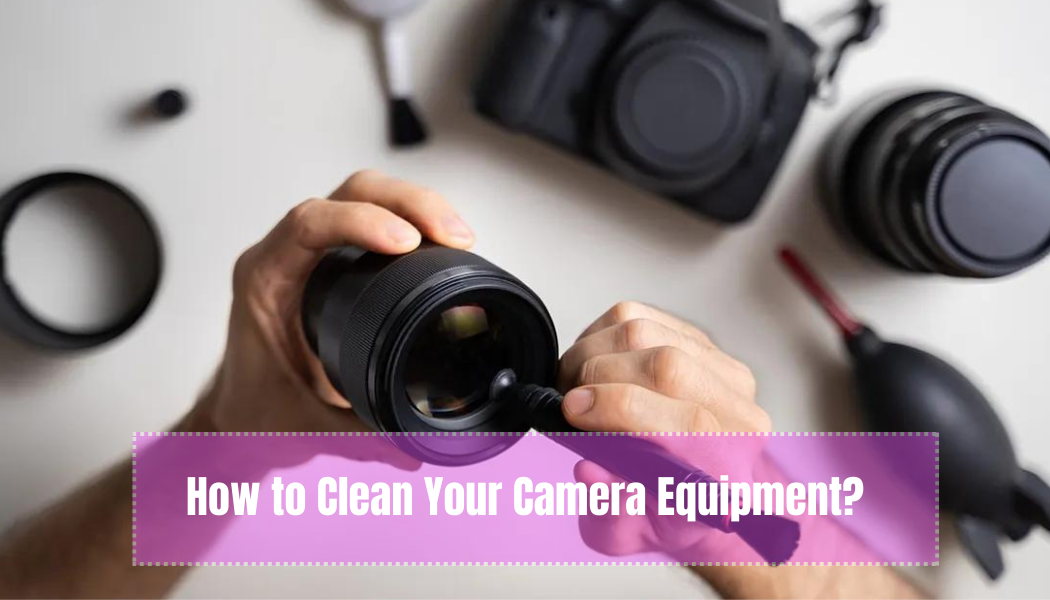Clean your camera equipment by brushing away loose dust and debris with a soft brush. Then, use a microfiber cloth with lens cleaning solution to remove smudges and fingerprints.
To take beautiful photos, you need a good camera and lens, as well as a keen eye and creativity. When you start taking photos, you’ll see how important it is to keep your camera clean. This helps your work look its best. Over time, dust, smudges, and debris can make images less clear and affect your gear.
In this guide, we’ll take you through the art of cleaning your camera equipment. Whether you’re a beginner or an experienced photographer, you’ll find helpful tips here. In order to maintain your gear, you need certain tools, techniques, and precautions. After reading this guide, you’ll be ready to clean your camera equipment and take great photos.
Contents
- 1 The Importance Of Cleaning Your Camera Equipment
- 2 Essential Tools For Cleaning Your Camera Equipment
- 3 How To Clean Your Camera Lenses Properly
- 4 6. Cleaning Other Camera Components:
- 5 Guide for Maintaining Your Camera Gear
- 6 Additional Tips to Clean Camera Equipment
- 7 Frequently Asked Questions For How To Clean Your Camera Equipment?
- 8 Conclusion
The Importance Of Cleaning Your Camera Equipment
To keep your photos looking good, it’s important to keep your camera equipment clean. Dirty equipment can have a negative impact on the outcome of your shots. Cleaning lenses and camera bodies regularly removes dust, smudges, and fingerprints.
As a result, your equipment works at its best, so you can take clear and sharp photos. Cleaning helps to prevent dirt and debris from accumulating in difficult-to-reach places. This buildup can harm your camera equipment. To save money and make your camera equipment last longer, keep it clean and avoid repairs or buying new ones.
If you clean your camera gear often, your photos will look better and show your skills.
Essential Tools For Cleaning Your Camera Equipment

To keep your camera gear in good condition, you need the right cleaning tools. This guide will tell you which tools you need to clean your camera safely and effectively.
- Lens Cleaning Pen
- Microfiber Cleaning Cloth
- Air Blower
- Lens Cleaning Fluid
- Sensor Cleaning Kit
- Cleaning Swabs
- Lens Cleaning Tissues
- Cleaning Brushes
- Lens Pen
- Gloves
To capture great photos and make your gear last, clean and maintain your camera regularly. Gather these important cleaning tools to keep your camera in the best condition. Then you can focus on capturing beautiful moments.
How To Clean Your Camera Lenses Properly
It’s important to keep your camera clean so your photos and gear perform well. Dust, dirt, and smudges can impact image clarity and damage sensitive components. This guide tell you how to clean your camera equipment so it lasts longer.
1. Gather Your Cleaning Tools:
Before you begin, collect all the cleaning tools listed in the Essential Tools For Cleaning Your Camera Equipment.
2. Preparing for Cleaning:
- To keep your gear clean, work in a dust-free place that doesn’t have particles.
- To clean a camera with interchangeable lenses, choose a room with little airflow. This will prevent dust from getting in.
- Power off and remove batteries from your camera before cleaning.
3. Cleaning Camera Lenses:
- Use an air blower to remove loose dust and dirt from the lens surface and crevices.
- Gently use a lens cleaning brush to eliminate stubborn particles.
- To clean the lens, put a little cleaning fluid on a cloth and wipe gently in circles.
- Use a lens cleaning pen’s brush to sweep away any remaining debris.
- To remove smudges or oil, gently clean with the lens cleaning pen’s tip or a microfiber cloth.
4. Cleaning Camera Sensors (Interchangeable Lens Cameras):
- Set your camera to sensor cleaning mode (if available) to expose the sensor.
- Use an air blower to remove any loose dust and particles.
- Select the right size of sensor cleaning swab. Next, just do what the manufacturer says and add a few drops of the cleaning solution.
- Gently swipe the swab across the sensor’s surface, making a single pass.
- Wait a moment for the sensor to dry before inspecting for cleanliness. If needed, repeat the process.
5. Cleaning Camera Screens and Surfaces:
- Power off your camera and use an air blower to remove loose dust and dirt from LCD screens and buttons.
- Clean the surfaces with a soft cloth or tissue, using cleaning fluid for stubborn smudges.
6. Cleaning Other Camera Components:
- Use a cleaning brush to remove dust from crevices, buttons, and hard-to-reach areas.
- For detailed cleaning, use a lens pen’s brush and cleaning tip.
Guide for Maintaining Your Camera Gear
To keep your camera gear working well for a long time, make sure to maintain it properly. To improve your photos and gear, take care of your equipment. It doesn’t matter if you’re a professional or just enjoy photography as a hobby. Here’s a comprehensive guide on how to effectively maintain your camera gear:
1. Cleaning:
To keep your equipment working well, clean it regularly to avoid dust, dirt, and moisture.
- Lenses: Use a lens cleaning pen or a microfiber cloth to remove fingerprints and smudges. For more thorough cleaning, use a lens cleaning solution and a lens tissue.
- Sensors (Interchangeable Lens Cameras): Keep your camera’s sensor clean to avoid dust spots on your images. Follow the sensor cleaning steps outlined in the earlier guide.
- Camera Body: Wipe down the camera body with a microfiber cloth to remove dirt and moisture. Pay attention to buttons, dials, and crevices.
- Screens: Use a microfiber cloth to clean LCD screens and viewfinders. If necessary, use a screen-safe cleaning solution.
2. Storage:
Proper storage helps protect your gear from physical damage, dust, and humidity.
- Camera Bag: Invest in a high-quality camera bag that offers cushioning and protection. Make sure it’s large enough to accommodate your gear and accessories.
- Lens Caps: Always use lens caps to protect your lenses from dust and scratches when they’re not in use.
- Dry Environment: Store your equipment in a dry, cool environment to prevent mold growth and electronic damage
3. Handling and Transport:
Proper handling and transportation can prevent accidental damage to your gear.
- Straps: Use a comfortable camera strap to prevent accidental drops.
- Changing Lenses: If you need to change lenses, do so in a controlled environment to minimize dust exposure.
- Transport: Secure your camera gear in your bag and avoid placing heavy objects on top of it.
4. Battery Care:
Batteries are essential to your camera’s operation. Proper battery care can extend their lifespan.
- Charge: Charge your batteries before they’re completely depleted to avoid over-discharging.
- Storage: If you won’t be using your gear for an extended period, partially charge your batteries and remove them from the camera.
- Temperature: Avoid exposing batteries to extreme temperatures, as it can affect their performance.
5. Regular Inspections:
Frequent inspections can help identify potential issues before they escalate.
- Check for Damage: Regularly inspect your gear for signs of wear, scratches, or cracks.
- Mounts: Ensure your lens mounts are clean and free of debris to prevent damage during lens changes.
6. Maintenance Schedule:
To stay organized and keep your gear in good shape, make a maintenance schedule.
- Daily: Wipe down your gear after each use to remove dirt and smudges.
- Weekly: Perform a more thorough cleaning of lenses, sensors, and screens.
- Monthly: Check for wear and tear, and inspect battery health.
- Before Big Shoots: Conduct a comprehensive check to ensure all gear is in top condition.
7. Professional Servicing:
Sometimes, professional servicing is necessary, especially for intricate repairs or intricate internal cleaning.
- Sensor Cleaning: If you’re uncomfortable cleaning the sensor yourself, consider professional sensor cleaning services.
- Warranty: If your gear is under warranty, make use of manufacturer-approved service centers for repairs.
8. Education:
Understanding your camera and its maintenance needs is essential for effective upkeep.
- Manual: Read and understand your camera’s manual for specific maintenance guidelines.
- Educate Yourself: Learn about the specific needs of your camera model and the recommended maintenance practices.
Additional Tips to Clean Camera Equipment
Here are five additional tips to help you effectively clean your camera equipment:
1. Use a Rocket Blower Before Wiping:
Before cleaning your equipment, use a rocket blower to blow off any dust. Then, gently wipe with a microfiber cloth. When you wipe, it removes loose dust and debris, so you won’t scratch the surface.
2. Avoid Direct Sunlight and Heat:
When you clean your camera gear, pick a spot that is not in direct sunlight or extreme heat. When it is hot, cleaning solutions can evaporate fast, leaving residue. Sunlight can make smudges and streaks hard to see.
3. Follow a Pattern:
When you clean camera lenses or other surfaces, it’s best to use circular motions. Make sure to clean in a consistent pattern. This helps ensure that you cover the entire area and avoid missing spots.
4. Test New Cleaning Products:
Before you use a new cleaning solution or tool on your camera, try it out on something that isn’t as important. Make sure it won’t cause any bad reactions.
5. Keep Cleaning Tools Clean:
Over time, dirt and oils can build up on microfiber cloths, lens-cleaning pens, and other tools. Clean or replace them often to avoid transferring dirt when you clean your equipment.
Note: Remember, gentle and cautious cleaning techniques are essential. If you can’t clean tough dirt or smudges, professionals can help you protect your gear.
Frequently Asked Questions For How To Clean Your Camera Equipment?
How Often Should I Clean My Camera Equipment?
After using your camera, clean it to keep it working well and prevent dirt buildup.
What Tools Should I Use To Clean My Camera Lenses?
To clean your camera lenses, you will need a microfiber cloth, lens cleaning solution, and a blower brush. Use them to remove dust and smudges.
Can I Use Water To Clean My Camera Body?
No, it is not advisable to use water directly on your camera body. Instead, use a soft cloth or lens cleaning solution to wipe away dirt and grime.
How Should I Store My Camera Equipment When Not In Use?
Keep your camera equipment in a dry, dust-free place, like a camera bag, to protect it.
Are There Any Precautions I Should Take While Cleaning My Camera Sensor?
To clean your camera sensor, don’t touch it directly. Use a sensor cleaning kit made for this.
Conclusion
Keeping your camera equipment clean is essential for ensuring optimal performance and longevity. To remove dust, dirt, and smudges from your camera, follow these easy steps in the blog. Cleaning your equipment regularly keeps the image quality from getting worse. It also reduces the risk of damage from debris.
To clean your camera, use a soft cloth, a brush, and camera cleaning solution. To avoid scratching delicate surfaces, clean them gently and don’t use too much force. Keeping your camera equipment in good condition is important. Regular maintenance helps you take great photos and videos.
So, start cleaning today and enjoy the benefits of a well-maintained camera gear!


